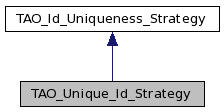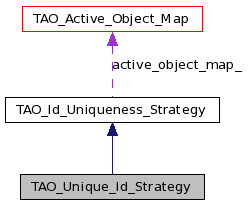Unique id strategy. More...
#include <Active_Object_Map.h>


Public Member Functions | |
| virtual int | is_servant_in_map (PortableServer::Servant servant, bool &deactivated) |
| Must be used with UNIQUE_ID policy. | |
| virtual int | unbind_using_user_id (const PortableServer::ObjectId &user_id) |
| virtual int | find_user_id_using_servant (PortableServer::Servant servant, PortableServer::ObjectId_out user_id) |
| virtual int | find_system_id_using_servant (PortableServer::Servant servant, PortableServer::ObjectId_out system_id, CORBA::Short &priority) |
| virtual int | bind_using_user_id (PortableServer::Servant servant, const PortableServer::ObjectId &user_id, CORBA::Short priority, TAO_Active_Object_Map_Entry *&entry) |
| virtual CORBA::Boolean | remaining_activations (PortableServer::Servant servant) |
Unique id strategy.
Strategy for the UNIQUE_ID policy.
Definition at line 338 of file Active_Object_Map.h.
| int TAO_Unique_Id_Strategy::bind_using_user_id | ( | PortableServer::Servant | servant, | |
| const PortableServer::ObjectId & | user_id, | |||
| CORBA::Short | priority, | |||
| TAO_Active_Object_Map_Entry *& | entry | |||
| ) | [virtual] |
Can be used with any policy. With the SYSTEM_ID policy, user_id is actually system_id.
Implements TAO_Id_Uniqueness_Strategy.
Definition at line 413 of file Active_Object_Map.cpp.
{
int result =
this->active_object_map_->user_id_map_->find (user_id, entry);
if (result == 0)
{
if (servant != 0)
{
entry->servant_ = servant;
result =
this->active_object_map_->servant_map_->bind (entry->servant_,
entry);
#if defined (TAO_HAS_MONITOR_POINTS) && (TAO_HAS_MONITOR_POINTS == 1)
if (result == 0)
{
this->active_object_map_->monitor_->receive (
this->active_object_map_->servant_map_->current_size ());
}
#endif /* TAO_HAS_MONITOR_POINTS==1 */
}
}
else
{
ACE_NEW_RETURN (entry,
TAO_Active_Object_Map_Entry,
-1);
entry->user_id_ = user_id;
entry->servant_ = servant;
entry->priority_ = priority;
result = this->active_object_map_->id_hint_strategy_->bind (*entry);
if (result == 0)
{
result =
this->active_object_map_->user_id_map_->bind (entry->user_id_,
entry);
if (result == 0)
{
if (servant != 0)
{
result =
this->active_object_map_->servant_map_->bind (
entry->servant_,
entry);
}
if (result != 0)
{
this->active_object_map_->user_id_map_->unbind (
entry->user_id_);
this->active_object_map_->id_hint_strategy_->unbind (
*entry);
delete entry;
}
else
{
#if defined (TAO_HAS_MONITOR_POINTS) && (TAO_HAS_MONITOR_POINTS == 1)
this->active_object_map_->monitor_->receive (
this->active_object_map_->servant_map_->current_size ());
#endif /* TAO_HAS_MONITOR_POINTS==1 */
}
}
else
{
this->active_object_map_->id_hint_strategy_->unbind (*entry);
delete entry;
}
}
else
{
delete entry;
}
}
return result;
}
| int TAO_Unique_Id_Strategy::find_system_id_using_servant | ( | PortableServer::Servant | servant, | |
| PortableServer::ObjectId_out | system_id, | |||
| CORBA::Short & | priority | |||
| ) | [virtual] |
Must be used with UNIQUE_ID policy. With the SYSTEM_ID policy, <user_id> is actually system_id.
Implements TAO_Id_Uniqueness_Strategy.
Definition at line 559 of file Active_Object_Map.cpp.
{
TAO_Active_Object_Map_Entry *entry = 0;
int result = this->active_object_map_->servant_map_->find (servant,
entry);
if (result == 0)
{
if (entry->deactivated_)
{
result = -1;
}
else
{
result =
this->active_object_map_->id_hint_strategy_->system_id (
system_id,
*entry);
if (result == 0)
{
priority = entry->priority_;
}
}
}
return result;
}
| int TAO_Unique_Id_Strategy::find_user_id_using_servant | ( | PortableServer::Servant | servant, | |
| PortableServer::ObjectId_out | user_id | |||
| ) | [virtual] |
Must be used with UNIQUE_ID policy. With the SYSTEM_ID policy, user_id is actually system_id.
Implements TAO_Id_Uniqueness_Strategy.
Definition at line 534 of file Active_Object_Map.cpp.
{
TAO_Active_Object_Map_Entry *entry = 0;
int result = this->active_object_map_->servant_map_->find (servant, entry);
if (result == 0)
{
if (entry->deactivated_)
{
result = -1;
}
else
{
ACE_NEW_RETURN (user_id,
PortableServer::ObjectId (entry->user_id_),
-1);
}
}
return result;
}
| int TAO_Unique_Id_Strategy::is_servant_in_map | ( | PortableServer::Servant | servant, | |
| bool & | deactivated | |||
| ) | [virtual] |
Must be used with UNIQUE_ID policy.
Implements TAO_Id_Uniqueness_Strategy.
Definition at line 389 of file Active_Object_Map.cpp.
{
TAO_Active_Object_Map_Entry *entry = 0;
int result = this->active_object_map_->servant_map_->find (servant,
entry);
if (result == 0)
{
result = 1;
if (entry->deactivated_)
{
deactivated = true;
}
}
else
{
result = 0;
}
return result;
}
| CORBA::Boolean TAO_Unique_Id_Strategy::remaining_activations | ( | PortableServer::Servant | servant | ) | [virtual] |
Are there any remaining activations of servant in the active object map? Can be used with any policy.
Implements TAO_Id_Uniqueness_Strategy.
Definition at line 590 of file Active_Object_Map.cpp.
{
ACE_UNUSED_ARG (servant);
// Since servant are always unique here, return false.
return 0;
}
| int TAO_Unique_Id_Strategy::unbind_using_user_id | ( | const PortableServer::ObjectId & | user_id | ) | [virtual] |
Can be used with any policy. With the SYSTEM_ID policy, user_id is actually system_id.
Implements TAO_Id_Uniqueness_Strategy.
Definition at line 499 of file Active_Object_Map.cpp.
{
TAO_Active_Object_Map_Entry *entry = 0;
int result = this->active_object_map_->user_id_map_->unbind (user_id,
entry);
if (result == 0)
{
if (entry->servant_ != 0)
{
result =
this->active_object_map_->servant_map_->unbind (entry->servant_);
}
if (result == 0)
{
result =
this->active_object_map_->id_hint_strategy_->unbind (*entry);
#if defined (TAO_HAS_MONITOR_POINTS) && (TAO_HAS_MONITOR_POINTS == 1)
this->active_object_map_->monitor_->receive (
this->active_object_map_->servant_map_->current_size ());
#endif /* TAO_HAS_MONITOR_POINTS==1 */
}
if (result == 0)
{
delete entry;
}
}
return result;
}
 1.7.0
1.7.0